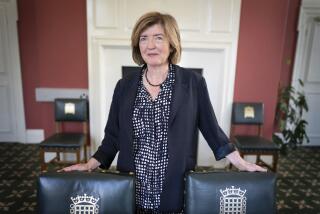Second Scotland Yard official resigns amid phone-hacking scandal
- Share via
Following the resignation of his boss, Scotland Yard chief Paul Stephenson, a second senior British police officer quit Monday amid the phone-hacking scandal that has reached into the highest levels of public life in Britain.
Assistant Commissioner John Yates was under heavy pressure for his ties with the News of the World and his decision not to reopen an investigation into hacking allegations at the now-defunct tabloid two years ago.
Stephenson resigned Sunday in a shocking turn of events that came hours after the arrest of one of media baron Rupert Murdoch’s most trusted deputies.
He said on Sunday night that he was stepping down as commissioner of the Metropolitan Police Service, as Scotland Yard is formally known, because of continued criticism and speculation over links between senior police officials and Murdoch’s media empire.
The surprising developments are certain to focus greater attention on Murdoch’s scheduled appearance Tuesday before a parliamentary committee to answer questions on the allegations of large-scale cellphone hacking by the News of the World, owned by his media conglomerate, News Corp.
Prime Minister David Cameron said on a trip to Africa that Parliament would convene for an extra day Wednesday before its summer recess to deal with the hacking scandal.
The scandal has reached far beyond the media to envelop the police, who have been accused of conducting a halfhearted investigation into the hacking allegations in order to preserve a good relationship with the press, and high-ranking politicians, who have also been criticized for maintaining too-cozy ties with the media, Murdoch’s newspapers in particular.
Public confidence in key institutions of British society -- the police, politicians and the press -- has now been badly shaken.
Stephenson acknowledged that Scotland Yard’s initial inquiry of allegations of phone hacking by the News of the World several years ago was inadequate, though he said he could only rely on the word of his subordinates that the investigation had been thorough and successful.
He said he was unaware of the existence of about 11,000 pages of evidence seized from a private investigator hired by the News of the World -- papers that showed the tabloid may have ordered the hacking of the cellphones of nearly 4,000 people, including celebrities, politicians and crime victims.
Stephenson also rejected allegations of impropriety over Scotland Yard’s decision to hire a former executive editor of the News of the World as a part-time public-relations consultant in 2009, at a time when the police were being pressed to renew their investigation into the hacking allegations. That editor, Neil Wallis, has since been arrested in connection with the scandal, raising questions about Stephenson’s judgment.
“As commissioner, I carry ultimate responsibility for the position we find ourselves in. With hindsight, I wish we had judged some matters involved in this affair differently. I didn’t and that’s that,” he said in a prepared statement.
The hacking allegations are now the subject of a massive new investigation by Scotland Yard headed by officers who were not involved in the original effort. Stephenson said the new inquiry would give the police “the opportunity to right the wrong done to victims.”
He said it was important for him to step down now to allow the appointment of a new commissioner in good time before London hosts the Summer Olympics in 2012, which will require a mammoth security operation.
Stephenson brushed aside another controversy over his acceptance of a free stay at a spa connected to Wallis.
“My integrity is completely intact. I may wish we had done some things differently, but I will not lose any sleep over my personal integrity,” he said emphatically.
Earlier Sunday, Rebekah Brooks became the highest-ranking executive in Murdoch’s media empire to be arrested in connection with the scandal. After being questioned, she was released on bail early Monday, British news reports said.
Until her resignation Friday, Brooks was head of News International, News Corp.’s British subsidiary, and one of Murdoch’s closest confidants. She served as editor of the News of the World from 2000 to 2003. In 2002, the paper is believed to have hacked into the cellphone of a kidnapped 13-year-old girl who was later found slain.
Last week, both Stephenson and Brooks were called to appear at the same parliamentary committee hearing as Murdoch to give evidence. Stephenson is still expected to attend Tuesday; Brooks’ participation has now been thrown into doubt.
For Murdoch, the challenge Tuesday will be to strike the right note of humility and contrition, to answer questions as truthfully as he can while protecting his company’s interests, and to remember that his audience extends far beyond the handful of lawmakers before him to millions of television viewers worldwide.
Analysts said it was the media mogul’s only hope for salvaging a reputation so badly battered that a man once powerful enough to make British lawmakers come running finds himself being peremptorily summoned by them instead.
More to Read
Sign up for Essential California
The most important California stories and recommendations in your inbox every morning.
You may occasionally receive promotional content from the Los Angeles Times.











